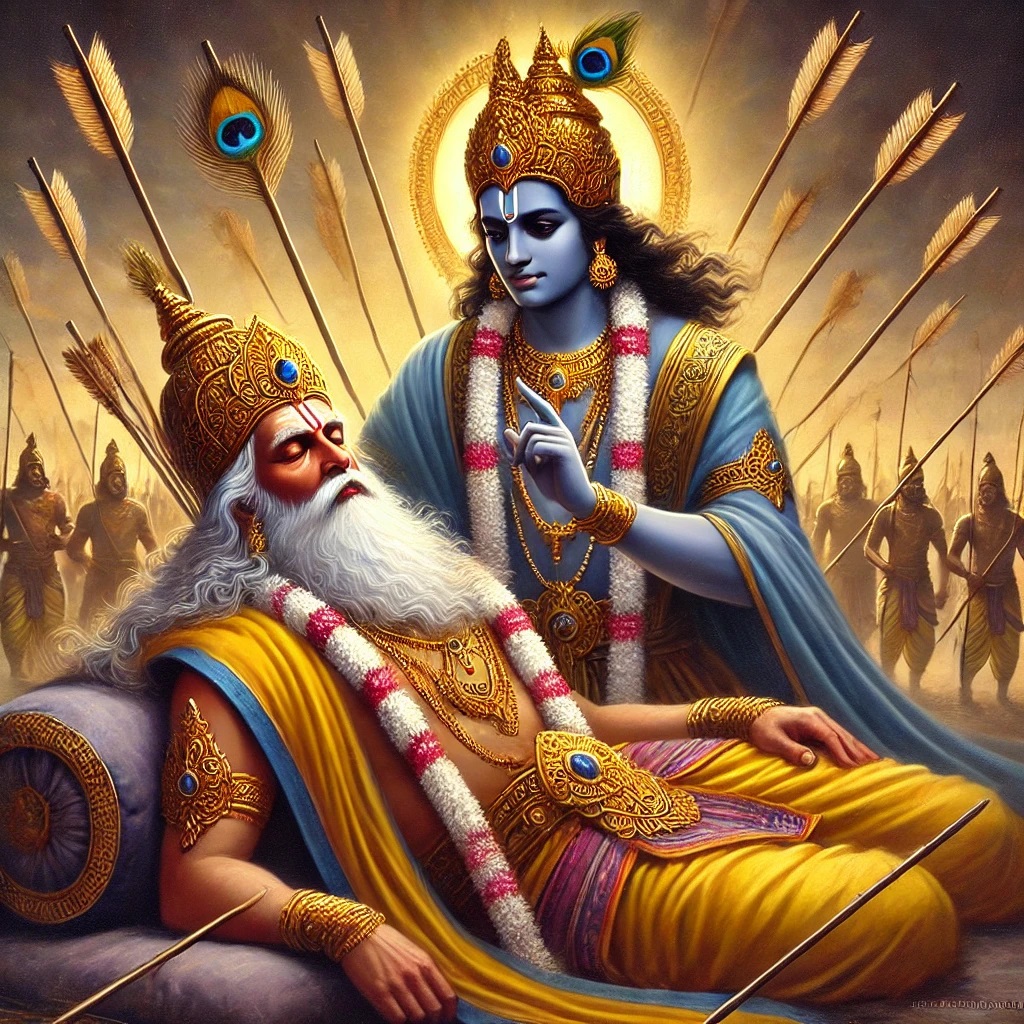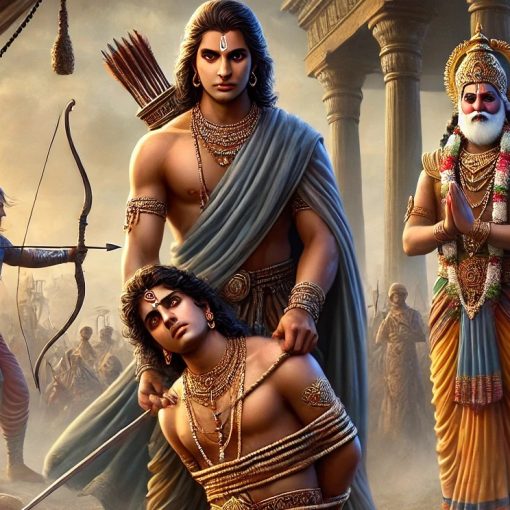Bhīṣmadeva’s Final Moments: A Grand Departure Filled with Supreme Wisdom (SB 1.9)
In the timeless teachings of Śrīmad-Bhāgavatam, few stories capture the essence of devotion, wisdom, and spiritual fulfillment as deeply as the final moments of Bhīṣmadeva in Śrīmad-Bhāgavatam 1.9. Bhīṣma’s departure from this material world is a dramatic spiritual event filled with lessons for anyone seeking higher understanding—whether a devotee, seeker, or even a curious reader. The chapter is a beacon of devotion, sacrifice, and spiritual realization that emphasizes the power of remembering Kṛṣṇa at the time of death.
The Hero of Dharma: Bhīṣmadeva’s Unique Life
Bhīṣmadeva is not merely a central figure of the Mahābhārata, but also one of the twelve mahājanas—the great authorities on devotional service. Born as the son of Gaṅgā-devī and Śāntanu, Bhīṣma was renowned for his extraordinary vows, unmatched skills as a warrior, and unwavering dedication to dharma (righteousness). He sacrificed personal happiness for the greater good of the Kuru dynasty. Throughout his life, he adhered strictly to principles, demonstrating complete control over his mind and senses.
In the battle of Kurukṣetra, Bhīṣma played a key role, fighting valiantly for the Kauravas despite knowing that the Pāṇḍavas were righteous. His commitment to dharma was unwavering, as he believed it was his duty to serve as the commander of the Kaurava army. However, his heart was always aligned with Kṛṣṇa, recognizing Him as the Supreme Personality of Godhead. Bhīṣma’s life stands as a testament to the highest principles of dharma and dedication to a divine cause. Yet, his departure is where he offers the most potent spiritual lessons, transcending the material realm and entering the pure domain of bhakti, or loving devotion to the Supreme Personality of Godhead, Śrī Kṛṣṇa.
A Battlefield Transformed: The Bed of Arrows
The Kurukṣetra battlefield, which had witnessed the greatest war in the history of mankind, now sets the stage for a spiritual victory of a different kind. Bhīṣma lies on a bed of arrows, mortally wounded yet fully conscious. While his physical body suffers intense pain, his consciousness is fixed on a higher plane. The battlefield, known for violence and death, transforms into a sacred space for spiritual realization.
This unique setting illustrates an important truth: The challenges of the material body do not dictate the state of the soul. Bhīṣma’s ability to remain detached and focused on Kṛṣṇa, despite the unbearable pain, emphasizes the power of transcendental knowledge and surrender. As a devotee, he transforms even the battlefield into a holy site by his meditative consciousness. Bhīṣma’s demeanor teaches us that true spiritual strength is not diminished by material conditions but is actually revealed in challenging circumstances.
Kṛṣṇa’s Arrival: Divine Compassion in Action
Kṛṣṇa arrives at Bhīṣma’s side, accompanied by the Pāṇḍavas, and this moment is filled with divine compassion and love. Kṛṣṇa, though the supreme ruler of the universe, comes to personally witness and bless the departure of His dear devotee. It’s a clear message for all practitioners of bhakti: Kṛṣṇa reciprocates with His devotees in the most personal and loving ways, regardless of His cosmic duties.
The Lord’s arrival is not merely symbolic; it is a declaration that He is present for His devotees, especially at the most crucial moment of death. In this intimate moment, Kṛṣṇa not only stands beside Bhīṣma but also listens attentively as Bhīṣma speaks his final words of wisdom. This act of compassion shows that Kṛṣṇa values His devotees’ realizations and honors their dedication.
Kṛṣṇa’s presence beside Bhīṣma’s bed of arrows is a powerful representation of the divine grace that awaits every sincere seeker. It signifies that the Lord is always willing to be with His devotee, especially at the most critical moment—death. The intimate reciprocation between Bhīṣma and Kṛṣṇa underscores the principle that surrender to the Supreme results in a personal connection that transcends all material boundaries.
Bhīṣma’s Glorification of Kṛṣṇa: The Essence of Devotion
As Kṛṣṇa stands before him, Bhīṣma’s heart is filled with a deep sense of gratitude and love. Despite his physical state, he begins to offer heartfelt prayers—glorifying the Supreme Lord. His stotra (prayer) is not just a collection of verses but a spontaneous overflow of his devotion. Bhīṣma recalls Kṛṣṇa’s role in the Mahābhārata war, His clever tactics to protect the Pāṇḍavas, and His willingness to break His vow for the sake of His devotee, Arjuna.
These prayers reflect Bhīṣma’s realization that Kṛṣṇa is the Supreme Protector. Whether acting as a charioteer or guiding the destiny of the universe, Kṛṣṇa’s actions are always aligned with the welfare of His devotees. Bhīṣma focuses his mind solely on Kṛṣṇa’s beautiful form, describing the Lord’s charming features and transcendental qualities. He emphasizes Kṛṣṇa’s compassion, mercy, and readiness to protect His devotees at all costs. For Bhīṣma, the essence of life’s ultimate success is not in winning battles or adhering strictly to social dharma, but in unconditionally surrendering to Kṛṣṇa’s will.
Lessons from Bhīṣma’s Prayers
Bhīṣma’s stotra is filled with profound spiritual insights that serve as guiding principles for all devotees:
- Focus on Kṛṣṇa: Bhīṣma’s consciousness, even at the time of death, is wholly focused on the Lord. His prayers teach us that life’s greatest achievement is to develop an unflinching attachment to Kṛṣṇa. This attachment doesn’t come merely from ritualistic worship but from a lifetime of sincere dedication and realization.
- The Supreme Friend: Bhīṣma reflects on Kṛṣṇa’s roles as a protector, guide, and friend of the Pāṇḍavas. It emphasizes that Kṛṣṇa is not a distant God but the most intimate well-wisher of His devotees. He is always eager to reciprocate the love of those who surrender to Him, irrespective of their material qualifications.
- Transcending Material Suffering: Despite the immense pain of his physical wounds, Bhīṣma’s mind is fully absorbed in Kṛṣṇa’s divine form. This teaches us that the physical body is temporary, but the soul’s relationship with the Lord is eternal. Real spiritual advancement means transcending bodily identification and focusing entirely on the eternal relationship with Kṛṣṇa.
- Fearlessness in Devotion: Bhīṣma’s fearless acceptance of death is rooted in his unwavering faith in Kṛṣṇa. Devotees who cultivate a similar faith can face all challenges, including death, with a steady mind.
Bhīṣma’s Instructions to the Pāṇḍavas: True Dharma Unfolded
Before his departure, Bhīṣma gives his final instructions to Yudhiṣṭhira and the Pāṇḍavas. These teachings are not mere words of wisdom but are based on Bhīṣma’s lifelong experience of serving dharma. He advises Yudhiṣṭhira on the principles of leadership, justice, and the importance of spiritual realization in governance.
Bhīṣma emphasizes that a true ruler is not just a controller of territories but a servant of the people. The ultimate responsibility of a king is to establish dharma and create a spiritually conducive environment for the citizens. Bhīṣma’s advice holds immense relevance for modern leaders as well. It challenges them to rise above personal ambitions and become selfless servants of the people, guided by the principles of dharma.
Bhīṣma’s Departure: The Perfect Meditation
As the auspicious moment of uttarāyaṇa (the northern solstice) arrives, Bhīṣma prepares to leave his body. His mind is entirely absorbed in Kṛṣṇa’s form, and his gaze is fixed on the Lord standing before him. This departure is a perfect demonstration of yoga, the process of connecting with the Supreme at the time of death. Bhīṣma’s departure shows that success in life is measured by one’s ability to remember Kṛṣṇa at the time of death.
Bhīṣma’s passing is not only an individual achievement but also a lesson for all spiritual aspirants. It exemplifies that death is not to be feared; rather, it is an opportunity for a devotee to enter the eternal service of the Supreme Lord. Bhīṣma’s departure is marked by complete surrender, devoid of any material regrets or attachments, signifying the ultimate success of a devotee’s life.
Call to Action: Embody Bhīṣma’s Teachings in Daily Life
The chapter on Bhīṣmadeva’s departure is a powerful call to action for all seekers of truth and spiritual wisdom. Bhīṣma’s life and teachings provide a clear pathway toward achieving spiritual success. Here are some practical ways to apply his teachings:
- Practice Mindfulness of Kṛṣṇa Daily: Incorporate regular prayer, meditation, and remembrance of Kṛṣṇa into your daily routine, just as Bhīṣma did. This will prepare your mind to be steady and focused, especially during challenging times.
- Embrace the Role of Service: Bhīṣma’s life exemplifies the importance of serving others selflessly. Look for opportunities to serve your family, community, and the Supreme Lord, without expecting anything in return.
- Face Challenges with Faith: Life is filled with difficulties, but Bhīṣma teaches us to face them with unwavering faith in Kṛṣṇa. Cultivate this faith through regular association with devotees, study of sacred scriptures, and sincere prayer.
- Prepare for a Glorious Departure: Bhīṣma’s focus on Kṛṣṇa at the time of death shows the importance of cultivating spiritual habits throughout life. Strive to develop a personal relationship with Kṛṣṇa, so that your final moments can also be filled with His remembrance.
- Lead with Righteousness: Bhīṣma’s advice to Yudhiṣṭhira is relevant not just for kings but for anyone in a position of authority. Lead by example, uphold the principles of dharma, and foster spiritual awareness among those under your care.
Conclusion: Bhīṣmadeva’s Eternal Contribution to Bhakti
Bhīṣmadeva’s life is a shining example of devotion, dharma, and fearlessness. His departure from this world, filled with deep absorption in Kṛṣṇa, serves as a guide for all sincere devotees. Bhīṣma’s prayers, wisdom, and actions encapsulate the essence of the Śrīmad-Bhāgavatam’s teachings on pure devotion. Let us be inspired by Bhīṣma’s glorious example and strive to develop a life centered on loving service to Kṛṣṇa. May his teachings illuminate our path and lead us to the ultimate goal of spiritual fulfillment.





